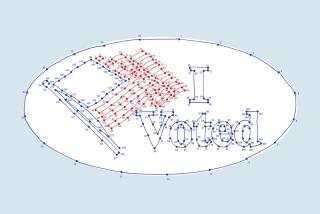Primary shenanigans
- Share via
CALIFORNIA VOTERS weary after five consecutive years of statewide elections since 2002 will finally get a breather this year. But if Sacramento legislators who are loath to give up any power get their way, we’ll be going back to the ballot box in 2008 with three more election cycles.
The state Senate has taken the first steps toward creating an early presidential primary for the Golden State. Moving the California presidential primary from June 3, 2008, to Feb. 5 will presumably give Californians a bigger role in determining who becomes the next president of the United States.
But voters beware! The trade-off for picking the next president will be losing our ability to have any competitive elections for the next four years.
Senate President Pro Tem Don Perata and Assembly Speaker Fabian Nunez don’t much care who the next president is -- they just want us to give them four more years in their safe legislative districts. Competitive November elections in California have become as distant a memory as UCLA basketball championships.
To get the early primary deal done, next February’s ballot would contain two political reform measures. One idea, popular with Gov. Arnold Schwarzenegger and good-government types, would take the power to redraw legislative district lines away from the legislators. The other idea, popular with incumbent elected officials, would extend voterimposed term limits, allowing sitting assemblymen and senators to serve an additional four to six years.
If you wonder why these measures cannot be on the regular June 2008 ballot, you’re missing the point of the whole early primary exercise. The deadline to file for office for the June election falls in March. Sitting incumbents whose terms are scheduled to end in 2008, like Nunez, need a ballot measure approved and certified before that March deadline. Thus, we get an early presidential primary with a ballot initiative attached.
In the past, California has held a consolidated primary -- in which we pick our nominees for president, Congress and the state Legislature all at the same time. These primaries have bounced all over the calendar from June to March and back again. But without an additional round of voting, Nunez and friends cannot keep their jobs.
Two years ago, when Schwarzenegger proposed a special election on redistricting reform, school reform and a number of other issues, his opponents included legislative leaders who cried foul over the election’s need and cost.
Today, those same legislators are advocating what amounts to a special election, costing voters tens of millions of dollars, saying it’s all in the name of good government. You don’t have to be a cynic to question this wholesale shift in values.
The cost to Sacramento power brokers for their job-contract extension is relatively low. Schwarzenegger is asking them to support meaningful redistricting reform.
Redistricting is crucial for restoring competition to California’s elections. In 1994, back when judges were drawing district lines, there were legitimate contests for 23 of 80 Assembly districts, 10 of 20 state Senate districts, and 16 of 49 congressional districts, according to the California Target Book. In 2006, the competition had dwindled to only five Assembly districts, two Senate districts and one congressional district, the Target Book found.
But the redistricting measure under discussion wouldn’t go into effect until the first election cycle after the next census, which is, coincidentally, four years after the November 2008 election.
Essentially, California would have no real elections over the next four years, because we would have the same people running in the same districts where there is no competition.
Apologists for the move say that even though legislators are acting in their own self-interest, their motives should be overlooked because they’re advancing the public interest by giving California voters a say in presidential politics. But California wouldn’t need a third election in 2008 if our legislators simply moved the scheduled, consolidated primary rather than splitting it in two at a cost to the taxpaying public.
For the $90 million we’ll spend just so incumbent legislators can keep running for office in safe seats, California could fix a few levees, buy some school uniforms or give healthcare to the neediest among us. Instead, it looks as if we’ll get an expensive early primary just to satisfy our legislators’ personal agendas.
More to Read
Get the L.A. Times Politics newsletter
Deeply reported insights into legislation, politics and policy from Sacramento, Washington and beyond. In your inbox twice per week.
You may occasionally receive promotional content from the Los Angeles Times.










